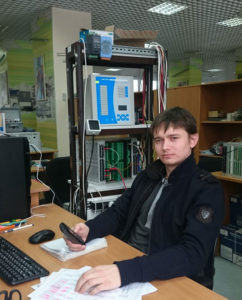 We present to your attention an interview with Mikhail Martynov, an employee of Relematika LLC, candidate of technical sciences, for the Ulyanovets newspaper.
We present to your attention an interview with Mikhail Martynov, an employee of Relematika LLC, candidate of technical sciences, for the Ulyanovets newspaper.
– Mikhail, why did you choose the profession of an engineer?
– To be honest, I got into the specialty “Relay Protection and Automation of Electric Power Systems” quite by accident. After graduating from school, until the last moment I could not decide which technical faculty to enter.
On the day of submitting documents, I planned to write applications for admission to various specialties. But it turned out that the lines at the admissions office were quite long, and I might not catch the return flight to get home. Then I decided to leave the original documents for admission to the Faculty of Energy and Electrical Engineering.
At the very first lessons I realized that I had made the right choice, since Cheboksary is the center of relay construction. In the first year I received good basic training in mathematics and physics, in the second year - in the theory of basic electrical engineering, in the third year - in networks and power engineering in general, in the fourth year - in system automation and relay protection, in the master's program - in the basics of successful inventive and scientific activity .
– When did you start your working career?
– As a first-year master’s student, he began working for Relematika LLC (formerly Bresler Research Center) as a research engineer. At first it was not easy, because there was a gap between practical skills and the theoretical training received. Therefore, it is important for students who want to achieve something in their specialty to prove themselves in their first years and get an internship at an enterprise.
Today I hold the position of leading research engineer. Our work is varied: from research and creation of new ideas to their implementation in devices and installation at a specific facility.
The team at the enterprise is good and friendly, because everyone clearly understands the task - both the success of the enterprise and personal material well-being depend on their actions.
– Share your opinion about the prospects and features of the company.
– Unlike many enterprises engaged in either resale of devices or assembly of protection cabinets from ready-made elements, our company carries out a full production cycle: from the development of new algorithms to their implementation in hardware. This means that we have specialists in both programming and engineering, as well as design and construction. This allows you to take on complex things and be flexible to market conditions. We are trusted with complex objects, and therefore you can be confident in the prospects of the enterprise both in favorable conditions and in times of crisis.
– What research are you working on now?
– As part of a scientific group, we are conducting research on the task of creating adaptive relay protection devices that not only have increased sensitivity, but also allow us to reduce the amount of calculation of response settings by an order of magnitude.
– What is it like to be a young PhD candidate?
– One day I came across a survey on the Internet: “Did defending your Ph.D. thesis help you?”, the results of which were: 20% - I don’t know, 30% - yes, 30% - it only hurt. I think that those who answered that it did harm initially did not know why they needed a dissertation.
I defended my dissertation in 2014 on the topic “Research and development of trainable modules for microprocessor-based power line protection.” To be honest, it gave me even more confidence in my abilities, the feeling that it is always possible to do more than you can imagine.
– What would you wish for students?
– I advise students, especially first-year students, to clearly understand from the outset why they need to study at a university, and to subordinate all their activities to this task. Only in this case will it be possible to achieve the goal.
For reference: Mikhail Martynov is a graduate of the Chuvash State University named after I.N. Ulyanov. In 2009 he graduated with a bachelor's degree and in 2011 with a master's degree from the Faculty of Energy and Electrical Engineering of the Chuvash State University named after I.N. Ulyanov. In 2014, at the age of 26, he defended his Ph.D. thesis.
A source: website of the Chuvash State University named after. I.N. Ulyanova



